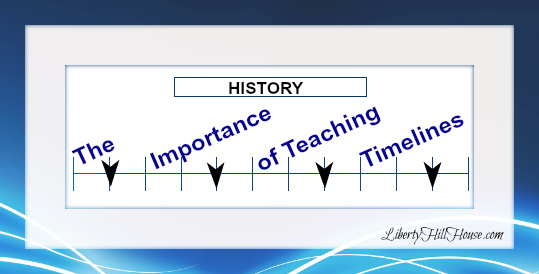History never quite made sense to me when I was a kid. Yes, I memorized “in 1492 Columbus sailed the ocean blue,” but I didn’t really know what 1492 meant. There were pilgrims involved. I was fairly sure of that. Oh, wait. Was Columbus even alive when the Mayflower landed?
Jumbled confusion reigned in my mind.
I want better for my children, but I’ll be honest, the idea of adding one more thing to our schedule was daunting. Our days are so busy. Should we bother with timelines? I’ve found that the answer is “Absolutely!”
It is well known that efficient graphic organizers help students to learn. Historical timelines are a useful strategy to enhance comprehension. They provide us with three key elements: Context, Chronology and Continuity.
Context
Learn better when information is placed in context
Out of context information has no connection to the events surrounding it. It is simply a story, and no matter how interesting that out of context story is, it is impossible to fully understand it without knowing what else was happening at that time.
One of the great advantages of timelines is the ability to “see” history. By studying (and eventually memorizing) a timeline, children are given the background knowledge on which they can place newly encountered information in relation to that which they have studied in the past. They have the ability to develop a sense of what each historic era means, and to connect the larger movements.
Chronology
At its core, history is the study of events that happened in the past. In an ideal world, we would know exactly what happened, from beginning to end, and it would be presented in a logical, systematic order. Unfortunately many seem to interpret this to mean that we need to memorize dates.
Memorizing dates is my least favorite part of history. It is an entirely useless endeavor unless we intentionally examine the importance of those numbers. Did the American Revolution come before or after the French Revolution? Is it important? Yes! Very much so, and a timeline can help your child to quickly recognize the connection and understand what happened. Rather than memorizing random unconnected numbers, they can see which came first, and begin to unravel the connection for themselves.
For a young mind to grasp the complexity of our history requires giving them the tools to assemble the puzzle pieces. Timelines provide them with that frame of reference. They organize data in a way that makes historical information easy to read and remember. They allow our students to see how history has unfolded, and in what order. This visual presentation helps our students to see clearly how history has been laid out, and avoid jumbling stories together.
Continuity
The entire point of studying history is to learn that it is a continuous story. Time never stops. The fall of one empire leads to another and an invention can cause lasting cultural change. This interconnection is easier to understand when you can see it.
Timelines allow our students make connections and to trace developments. They can discover patterns of action, cause and effect, recurring symbolisms, and lines of reasoning. They will see that events overlap, and categories aren’t all that clear cut.
We love our timeline. It has benefited us far more than I imagined.
Next week I’m going to be sharing a bit more about the process we use in memorizing our timeline, along with my favorite materials. Subscribe now, so you don’t miss it.
[subscribe2]



We just put a big, long timeline up in our hallway and we add to it as needed. I think I am learning just as much as the kids about history!
I am a visual learner, and I know that timelines help me understand history better. I agree that it is difficult to really understand history. Another issue is that our perspective can be quite different than at the time.